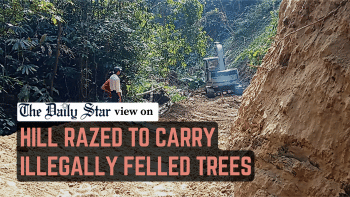Don’t let water bodies be destroyed at will

The juxtaposition of two pictures published in this paper on Friday—of a flood flow zone on Turag River 10 years apart—is a stark example of how unfettered greed has destroyed these vital wetlands that prevent, among other things, waterlogging in the city. The area in question, as an image from 2014 shows, was once covered with green, low-lying paddy fields that served as a reservoir of excess water during rainy seasons. However, as the other image shows, now it has been almost filled with various structures, including a particularly protruding restaurant.
This is just one of the many such areas that have been encroached and filled up over the years. Between 2010 and 2019, for example, Dhaka lost a mindboggling 3,440 out of the 9,556 acres of flood zones, water retention areas and water bodies. The result has been disastrous, with waterlogging invariably paralysing the city during heavy rainfall. These areas serve as important rainwater reservoirs and allow the biodiversity to flourish. They are also critical during fires as water from these areas can be used to put them out. With so much at stake, why are we still allowing their destruction?
Unfortunately, despite having various laws and policies in place to protect these precious zones, government institutions have often allowed encroachment to go on unabated. Rajuk, which can refuse to give permission for filling up such zones, must particularly bear the responsibility for its failure in this regard. The latest Detailed Area Plan (DAP) for Dhaka, for instance, allows construction of structures in certain flood-flow zones. Experts have rightly criticised the provision in DAP for setting up eco parks and other structures on farmlands, thus encouraging encroachment. But it seems such concerns are falling on deaf ears.
We know why these areas are being filled up—because of greedy, politically connected encroachers. But this must stop. The government must hold relevant organisations accountable for their failure to prevent onslaughts on these areas and restore them as quickly as possible.


 For all latest news, follow The Daily Star's Google News channel.
For all latest news, follow The Daily Star's Google News channel. 










Comments